Introduction_ Rethinking Globalization, Education, and Citizenship-1
- 格式:pdf
- 大小:524.87 KB
- 文档页数:19
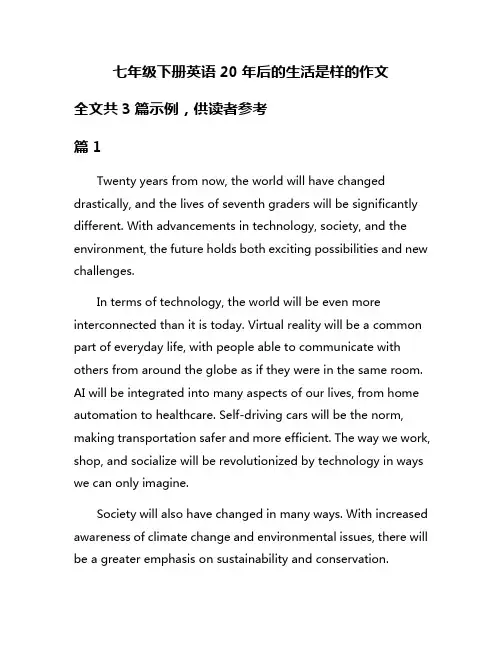
七年级下册英语20年后的生活是样的作文全文共3篇示例,供读者参考篇1Twenty years from now, the world will have changed drastically, and the lives of seventh graders will be significantly different. With advancements in technology, society, and the environment, the future holds both exciting possibilities and new challenges.In terms of technology, the world will be even more interconnected than it is today. Virtual reality will be a common part of everyday life, with people able to communicate with others from around the globe as if they were in the same room. AI will be integrated into many aspects of our lives, from home automation to healthcare. Self-driving cars will be the norm, making transportation safer and more efficient. The way we work, shop, and socialize will be revolutionized by technology in ways we can only imagine.Society will also have changed in many ways. With increased awareness of climate change and environmental issues, there will be a greater emphasis on sustainability and conservation.Renewable energy sources will power our homes and businesses, and efforts to combat pollution and protect natural habitats will be more widespread. The global population may have reached a tipping point, leading to changes in how resources are distributed and consumed. Social norms and cultural values will continue to evolve, leading to a more interconnected and diverse world.Education will have also undergone significant changes. With the rise of online learning platforms and personalized education programs, students will have more flexibility in how and what they learn. Schools will place a greater emphasis on critical thinking, problem-solving, and creativity, preparing students for the challenges of a rapidly changing world. The traditional classroom model may be replaced by more collaborative and interactive learning environments, where students can explore their interests and passions in a more personalized way.Overall, the future of seventh graders twenty years from now holds both excitement and uncertainty. While the world will be more technologically advanced and interconnected than ever before, there will also be new challenges to face, from environmental sustainability to social inequality. It will be up tothe next generation to navigate these changes and shape a future that is equitable, sustainable, and inclusive for all.篇2Twenty years from now, life in the seventh grade English textbooks will likely look very different from today. With advancements in technology, changes in society, and evolving educational methods, the way students learn and interact with the English language could be drastically transformed.One major factor that is likely to shape the English curriculum in twenty years is the integration of technology. With the rise of artificial intelligence and virtual reality, students may have access to highly interactive and personalized language learning tools. For example, instead of traditional textbooks, students may use holographic displays or virtual reality headsets to practice speaking and listening exercises. Online platforms and apps could also provide instant feedback on grammar and vocabulary, making language learning more efficient and engaging.Furthermore, as the world becomes more interconnected, the content of the English curriculum may also reflect global issues and perspectives. Students may engage in cross-culturalcommunication with peers from around the world through video conferences or online forums. Lessons on topics such as sustainability, social justice, and global citizenship could be integrated into the curriculum to promote awareness and understanding of diverse perspectives.In addition to technological advancements and global perspectives, the way English is taught and assessed may undergo significant changes in the future. Traditional exams and standardized tests may be replaced by more dynamic and interactive assessments that measure students' language skills in real-world contexts. For example, students may be evaluated on their ability to communicate effectively in English through presentations, projects, and debates rather than multiple-choice tests.Overall, the future of seventh-grade English education in twenty years is likely to be characterized by innovation, global awareness, and student-centered learning. By embracing technology, integrating global perspectives, and rethinking traditional teaching methods, educators can prepare students to thrive in a rapidly changing world where English proficiency is an essential skill.篇3Life in the year 2040, twenty years from now, will be vastly different from what it is today. With rapid advancements in technology, changes in our environment, and shifts in social norms, the world of the future will be a fascinating and challenging place to live in. This essay will explore some of the possible scenarios for seventh-grade students in the year 2040.One of the most significant changes that students can expect in the year 2040 is the use of advanced technology in education. By then, traditional classrooms will be a thing of the past, replaced by virtual learning environments where students can interact with their teachers and peers from all over the world. Students will have access to personalized learning experiences tailored to their individual needs and preferences, with artificial intelligence helping to guide their educational journey.In terms of communication, the way we interact with each other will be revolutionized by the development of new technologies. Social media platforms will be more immersive and interactive, allowing users to engage with each other in virtual reality spaces. Students will be able to connect with their friends and classmates in ways that were unimaginable in the past, fostering global connections and collaborations.The environment in the year 2040 will also be significantly different from what it is today. With the effects of climate change becoming more pronounced, students will be more aware of the need to live sustainably and protect our planet. Renewable energy sources will be the norm, and eco-friendly practices will be ingrained in daily life. Seventh-grade students in 2040 will be actively involved in environmental conservation efforts, working towards a greener and more sustainable future for all.In terms of leisure and entertainment, students in the year 2040 will have access to a wide range of options to relax and unwind. Virtual reality games and immersive experiences will be popular, allowing students to escape into fantastical worlds and explore new realities. Entertainment will be personalized and tailored to individual preferences, with AI algorithms predicting what students will enjoy and offering recommendations accordingly.In conclusion, life for seventh-grade students in the year 2040 will be vastly different from what it is today. With advancements in technology, changes in the environment, and shifts in social norms, the world of the future will offer new opportunities and challenges for students to navigate. By adapting to these changes and embracing the possibilities thatthe future holds, seventh-grade students in 2040 can look forward to a world that is exciting, dynamic, and full of potential.。
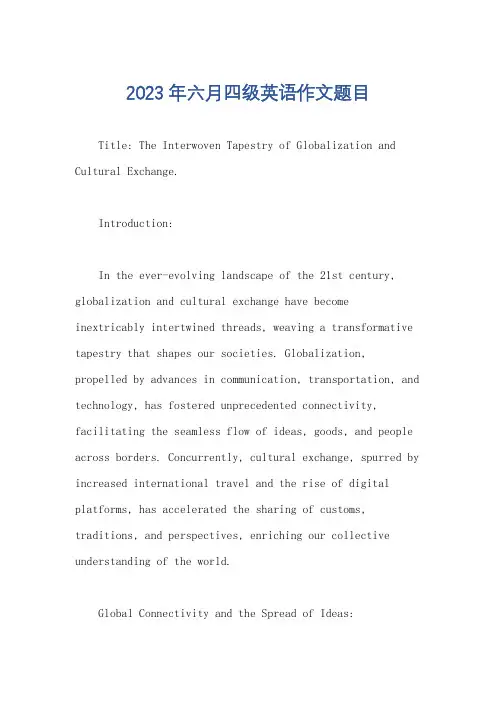
2021新时代好少年先进事迹学习心得体会五篇新时代好少年先进事迹发布活动通过视频短片、故事讲述、现场互动等方式,生动展示了“新时代好少年”的先进事迹。
以下是小编为大家准备了2021新时代好少年先进事迹学习心得体会,欢迎参阅。
新时代好少年先进事迹学习心得体会一每当你驻足在宛如万马奔腾的黄河旁;每当你站立在犹如绸条般的长城上;每当你仰望着那壮丽雄姿的五星红旗,你的心中是否如凶猛的洪水般热情澎湃?是否为自己是一个中国人而骄傲自豪?我们的祖先用聪明的智慧、勤劳的双手创造出伟大的中华文明和中华优秀传统文化,向世界奉献了无数的发明创造。
“实现中华民族伟大复兴,就是中华民族近代以来最伟大的梦想。
”这是一项光荣而艰巨的事业,需要一代又一代中国人不懈的共同为之努力。
新时代的我们,就是要继承先辈的事业,踏着先辈们的足迹,接过建设中华的接力棒,接续奋进,埋头苦干,砥砺前行。
幸福都是奋斗出来的。
没有艰辛就不是真正的奋斗。
如果不奋斗就会一事无成。
我们应该从自我做起,养成严格要求自己的好习惯,做德智体美全面发展的好少年。
身为少年,我们应该敢于有梦,从小树立高远志向。
志向是人生的航标。
一个人想要做出一番成就,就必须要有自己的志向,敢于追梦筑梦。
德国考古学家施里曼从小着迷于荷马史诗,立志找寻特洛伊古城。
虽然历尽重重磨难,费劲千辛万苦,但他始终勇往直前,终于在40年后,他凭着坚忍不拔的毅力、持之以恒的精神找到了人们以为因战争而早已毁灭的特洛伊城。
身为少年,我们应该勤奋学习,像海绵吸水一样学习知识。
我们现在最主要的任务是掌握文化知识,既要勤学书本上的知识,又要多学课外知识。
知识犹如浩瀚的大海,无边无际,永远也没有尽头,也永远不会枯竭。
对于我们的学习来说,持之以恒是极为重要的。
荀子在《劝学篇》里曾写道:“锲而不舍,金石可镂;锲而舍之,朽木不折”,“驽马十架,功在不舍”。
身为少年,我们应该热爱祖国,积极培育和践行社会主义核心价值观。
要养成良好品德,做一个有品德、有知识、有责任的好少年。
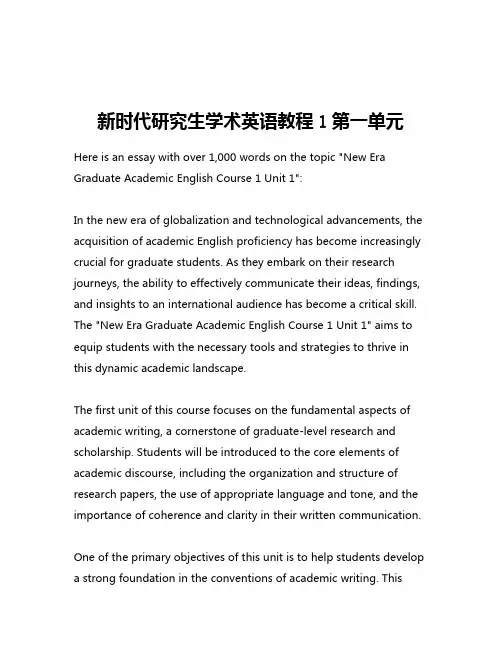
新时代研究生学术英语教程1第一单元Here is an essay with over 1,000 words on the topic "New Era Graduate Academic English Course 1 Unit 1":In the new era of globalization and technological advancements, the acquisition of academic English proficiency has become increasingly crucial for graduate students. As they embark on their research journeys, the ability to effectively communicate their ideas, findings, and insights to an international audience has become a critical skill. The "New Era Graduate Academic English Course 1 Unit 1" aims to equip students with the necessary tools and strategies to thrive in this dynamic academic landscape.The first unit of this course focuses on the fundamental aspects of academic writing, a cornerstone of graduate-level research and scholarship. Students will be introduced to the core elements of academic discourse, including the organization and structure of research papers, the use of appropriate language and tone, and the importance of coherence and clarity in their written communication.One of the primary objectives of this unit is to help students develop a strong foundation in the conventions of academic writing. Thisincludes understanding the purpose and structure of different sections within a research paper, such as the introduction, literature review, methodology, results, and discussion. By mastering these components, students will be better equipped to effectively convey their research objectives, contextualize their work within the existing body of knowledge, and present their findings in a logical and compelling manner.Furthermore, this unit emphasizes the significance of academic voice and tone. Graduate students are expected to adopt a formal, objective, and impersonal style in their writing, demonstrating their depth of understanding and critical thinking abilities. Through targeted exercises and feedback, students will learn to avoid common pitfalls, such as the overuse of personal pronouns, colloquial language, and emotional appeals, and instead cultivate a more academic and authoritative writing style.In addition to the structural and stylistic aspects of academic writing, this unit also addresses the fundamental principles of effective paragraph and sentence construction. Students will explore techniques for developing coherent and well-structured paragraphs, including the use of topic sentences, supporting evidence, and logical transitions. They will also delve into the nuances of sentence structure, exploring ways to vary sentence length, complexity, and rhythm to enhance the overall flow and readability of their work.One of the key focuses of this unit is the development of critical thinking and analysis skills. Graduate students are expected to engage in in-depth research, synthesize complex information, and formulate original arguments. This unit will guide students in honing these essential skills, teaching them how to critically evaluate sources, identify key themes and patterns, and construct persuasive and well-reasoned arguments.Furthermore, this unit emphasizes the importance of academic integrity and proper citation practices. Students will learn how to effectively incorporate and cite sources, ensuring that they avoid plagiarism and maintain the highest standards of scholarly ethics. They will be introduced to various citation styles, such as APA and MLA, and will practice implementing these guidelines throughout their academic writing.Another crucial aspect of this unit is the development of research skills. Graduate students are expected to be proficient in searching for, evaluating, and integrating relevant literature into their work. This unit will equip students with strategies for effectively navigating academic databases, identifying authoritative sources, and synthesizing the existing body of knowledge to support their research objectives.In addition to the core components of academic writing, this unit also addresses the importance of audience awareness and professional communication. Students will learn how to tailor their writing style and tone to specific academic or professional contexts, ensuring that their work is accessible and impactful to their intended readers. This includes strategies for effectively communicating complex ideas to both specialist and non-specialist audiences.Throughout this unit, students will have ample opportunities to apply the concepts and skills they have learned through a series of practical exercises and writing assignments. These activities will not only reinforce their understanding of academic writing but also provide valuable feedback and guidance from experienced instructors.By the end of this unit, students will have developed a comprehensive set of academic writing skills that will serve them well throughout their graduate studies and beyond. They will be equipped with the confidence and competence to effectively communicate their research, engage in scholarly discourse, and contribute to the advancement of knowledge in their respective fields.In conclusion, the "New Era Graduate Academic English Course 1 Unit 1" is a crucial stepping stone in the academic journey ofgraduate students. By mastering the fundamental principles of academic writing, critical thinking, and research skills, students will be well-positioned to excel in their graduate programs and to make meaningful contributions to the global academic community.。
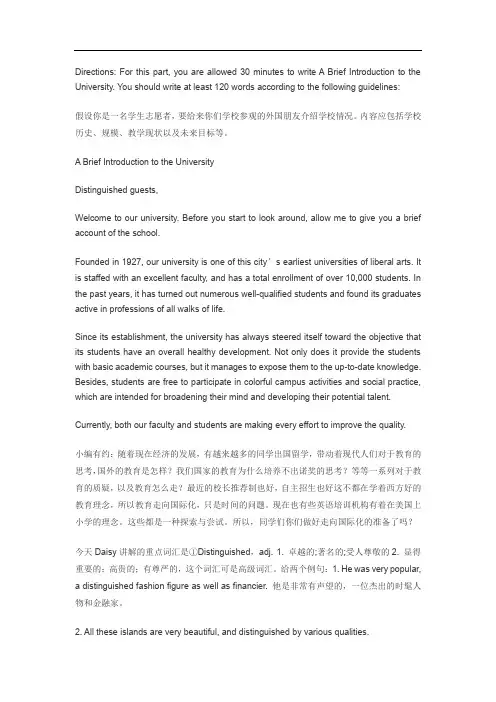
Directions: For this part, you are allowed 30 minutes to write A Brief Introduction to the University. You should write at least 120 words according to the following guidelines:假设你是一名学生志愿者,要给来你们学校参观的外国朋友介绍学校情况。
内容应包括学校历史、规模、教学现状以及未来目标等。
A Brief Introduction to the UniversityDistinguished guests,Welcome to our university. Before you start to look around, allow me to give you a brief account of the school.Founded in 1927, our university is one of this city’s earliest universities of liberal arts. It is staffed with an excellent faculty, and has a total enrollment of over 10,000 students. In the past years, it has turned out numerous well-qualified students and found its graduates active in professions of all walks of life.Since its establishment, the university has always steered itself toward the objective that its students have an overall healthy development. Not only does it provide the students with basic academic courses, but it manages to expose them to the up-to-date knowledge. Besides, students are free to participate in colorful campus activities and social practice, which are intended for broadening their mind and developing their potential talent.Currently, both our faculty and students are making every effort to improve the quality.小编有约:随着现在经济的发展,有越来越多的同学出国留学,带动着现代人们对于教育的思考,国外的教育是怎样?我们国家的教育为什么培养不出诺奖的思考?等等一系列对于教育的质疑,以及教育怎么走?最近的校长推荐制也好,自主招生也好这不都在学着西方好的教育理念,所以教育走向国际化,只是时间的问题。
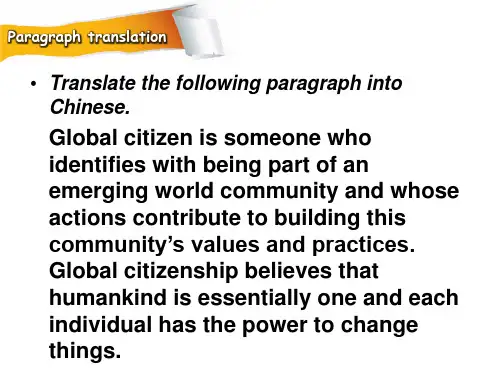
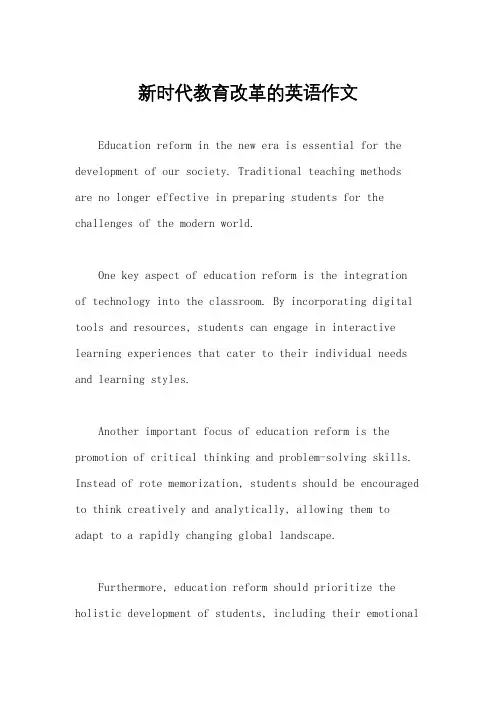
新时代教育改革的英语作文Education reform in the new era is essential for the development of our society. Traditional teaching methods are no longer effective in preparing students for the challenges of the modern world.One key aspect of education reform is the integration of technology into the classroom. By incorporating digital tools and resources, students can engage in interactive learning experiences that cater to their individual needs and learning styles.Another important focus of education reform is the promotion of critical thinking and problem-solving skills. Instead of rote memorization, students should be encouraged to think creatively and analytically, allowing them to adapt to a rapidly changing global landscape.Furthermore, education reform should prioritize the holistic development of students, including their emotionalintelligence and social skills. Building strong relationships and fostering empathy are crucial for creating a supportive and inclusive learning environment.In addition, education reform should emphasize the importance of lifelong learning and continuous personal growth. By instilling a love for learning and a growth mindset in students, we can empower them to navigate the complexities of the future with confidence and resilience.。
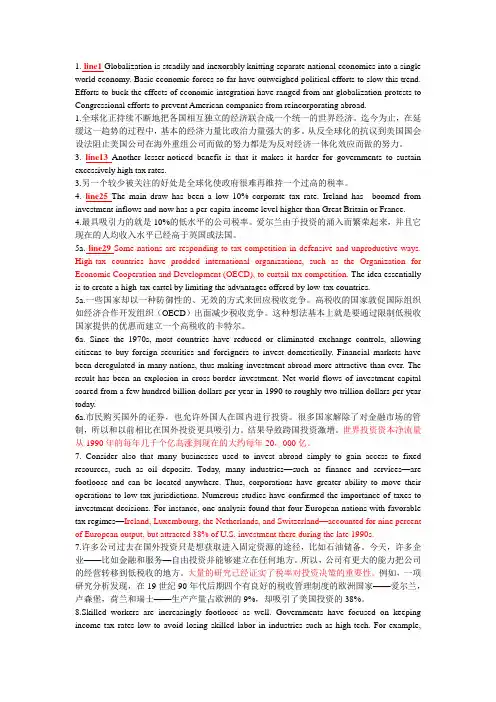
1. line1 Globalization is steadily and inexorably knitting separate national economies into a single world economy. Basic economic forces so far have outweighed political efforts to slow this trend. Efforts to buck the effects of economic integration have ranged from ant-globalization protests to Congressional efforts to prevent American companies from reincorporating abroad.1.全球化正持续不断地把各国相互独立的经济联合成一个统一的世界经济。
迄今为止,在延缓这一趋势的过程中,基本的经济力量比政治力量强大的多。
从反全球化的抗议到美国国会设法阻止美国公司在海外重组公司而做的努力都是为反对经济一体化效应而做的努力。
3. line13 Another lesser-noticed benefit is that it makes it harder for governments to sustain excessively high tax rates.3.另一个较少被关注的好处是全球化使政府很难再维持一个过高的税率。
4. line25 The main draw has been a low 10% corporate tax rate. Ireland has boomed from investment inflows and now has a per-capita income level higher than Great Britain or France.4.最具吸引力的就是10%的低水平的公司税率。
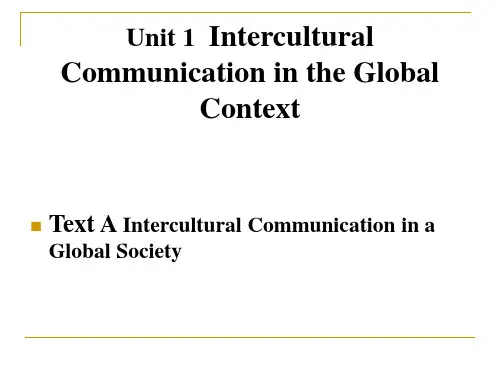
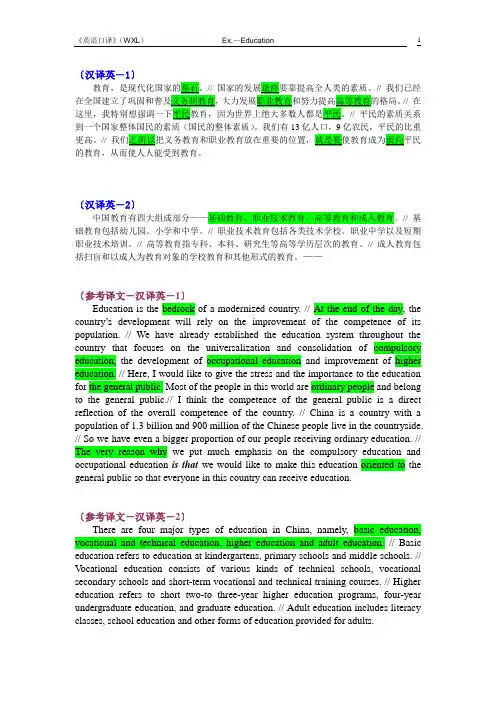
〔汉译英-1〕// 我们已经// 在。
我们有13更高。
//的教育,从而使人人能受到教育。
〔汉译英-2〕中国教育有四大组成部分——基础教育、职业技术教育、高等教育和成人教育。
// 基础教育包括幼儿园、小学和中学。
// 职业技术教育包括各类技术学校、职业中学以及短期职业技术培训。
// 高等教育指专科、本科、研究生等高等学历层次的教育。
// 成人教育包括扫盲和以成人为教育对象的学校教育和其他形式的教育。
——〔参考译文-汉译英-1〕Education is the bedrock of a modernized country. // At the end of the day, the country’s development will rely on the improvement of the competence of its population. // We have already established the education system throughout the country that focuses on the universalization and consolidation of compulsory education, the development of occupational education and improvement of higher education. // Here, I would like to give the stress and the importance to the education for the general public. Most of the people in this world are ordinary people and belong to the general public.// I think the competence of the general public is a direct reflection of the overall competence of the country. // China is a country with a population of 1.3 billion and 900 million of the Chinese people live in the countryside. // So we have even a bigger proportion of our people receiving ordinary education. // The very reason why we put much emphasis on the compulsory education and occupational education is that we would like to make this education oriented to the general public so that everyone in this country can receive education.〔参考译文-汉译英-2〕There are four major types of education in China, namely, basic education, vocational and technical education, higher education and adult education. // Basic education refers to education at kindergartens, primary schools and middle schools. // V ocational education consists of various kinds of technical schools, vocational secondary schools and short-term vocational and technical training courses. // Higher education refers to short two-to three-year higher education programs, four-year undergraduate education, and graduate education. // Adult education includes literacy classes, school education and other forms of education provided for adults.〔英译汉-1〕Harvard University was a product of the Puritans who settled here in 1630 or so. Of a total population of perhaps 15,000 or 20,000, there 130 Oxford and Cambridge graduates among the settlers, which is one to every 30 or 35 families, far in excess of what situation was in England. So, these educated Puritans pressured their local government to found a school for their sons, which it did in 1636. Because a Puritan named John Harvard bequeathed his library to the school, the school was named after him.For many years, the college was a very small institution, and its prospects of survival were –especially financially –very slim. But it survived those terrible years in the 1640s and 1650s, and, by the end of the century, it was well established, and its degrees were recognized by Oxford and Cambridge.In the years since then, Harvard, more than any other American university, has enjoyed remarkable financial support from its dedicated alumni. Without doubt, Harvard University in Massachusetts is the oldest university in the United States.〔英译汉-2〕In the English educational system, students take three very important examinations. // The first is the eleven-plus, which is taken at the age of eleven or a little past. At one time the ability or aptitude shown on the eleven-plus would have determined if a child stayed in school. Now, however, all children continue in “comprehensive” schools, and the eleven-plus determined which courses of study the child will follow. // At the age of fifteen or sixteen, the students are tested for the Ordinary Level of the General Certificate of Education.This examination covers a wide range of subjects; once students have passed this exam, they are allowed to specialize, so that two-thirds or more of their courses will be in physics, chemistry, classical languages, or whatever they wish to study at greater length.// The final examination, at eighteen, covers only the content of the special subjects. Even at the universities, students study only in their concentrated area, and very few students ever venture outside that subject again; in a real sense, the English boy or girl is a specialist from the age of fifteen〔参考译文-英译汉-1〕哈佛大学是1630年左右在这里定居的清教徒的产物。
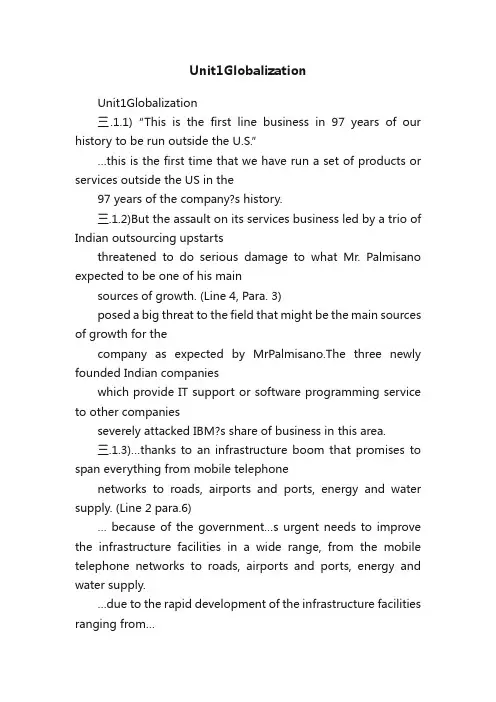
Unit1GlobalizationUnit1Globalization三.1.1)“This is the first line business in 97 years of our history to be run outside the U.S.”…this is the first time that we have run a set of products or services outside the US in the97 years of the company?s history.三.1.2)But the assault on its services business led by a trio of Indian outsourcing upstartsthreatened to do serious damage to what Mr. Palmisano expected to be one of his mainsources of growth. (Line 4, Para. 3)posed a big threat to the field that might be the main sources of growth for thecompany as expected by MrPalmisano.The three newly founded Indian companieswhich provide IT support or software programming service to other companiesseverely attacked IBM?s share of business in this area.三.1.3)…thanks to an infrastructure boom that promises to span everything from mobile telephonenetworks to roads, airports and ports, energy and water supply. (Line 2 para.6)… because of the government…s urgent needs to improve the infrastructure facilities in a wide range, from the mobile telephone networks to roads, airports and ports, energy and water supply.…due to the rapid development of the infrastructure facilities ranging from…三.1.4)…the best businesses in China are not yet on a par with the world’s foremost ones.(Line 2,Para. 9)…that it is still difficult even for the leading companies in China to compete with those global giants.…even the best companies in China can not be compared with the multinationals.三.1.5)… even European are a rarity, l et alone directors from emerging markets. .(Line 10, Para.11)…but they can find only a few qualified executives from the European countries, not to mention those from emerging markets.三.2.1)As for every big multinational, winning the “war for talent” is one of the most pressingissues, especially as hot labor markets in emerging markets are causing extremely highturnover rates. (Line 8, Para. 4)Because of the fact that the competition with local rivals has caused a high instability in staff employment of skilled professionals, it is crucial for multinationals to attract more local talents三.2.2)IBM reckons that its global reach gives it an edge in recruitment and retention over localrivals. (para.4)It is believed that as a big multinational company IBM enjoys advantages in recruiting and retaining talented managers over the local competitors.三.2.3)Although their revenue growth increased on the back of China’s continued economicgrowth, their ability to create value was still only half that of their global peers.(Line 3, Para.9)Despite the growth of their revenue increased on the back of China…s continued economic growth, they could only create half of the value of their global competitors.三.2.4)Mr. Hout reckons that the expatriated managers now deployed by multinationals inemerging markets are generally of a much higher quality than the “youn g bucks orretirement-posting types” they used to send. (Line 4, Para.10)No longer th e “young bucks or retirement-posing types” as they used to be, nowadays the expatriate managers appointed by multinationals to work in emerging markets aregenerally of a much higher quality.三.2.5)The founders of emerging-market firms are often impressive, but such firms typically lackthe depth of management talent of old multinationals .(Line 5, Para. 13)Compared with those old multinationals, the firms in emerging markets are typicallylacking the depth of management talent, though the founders are often impressive 1.hyper-growth(Line. 4, Para. 1) n. very fast growthhyper-:more than normal; too much 过度;过多hyper-criticalhyper-tensionSuper- 1)extremely; more or better than normal极;超;超级super-rich极富有superhuman超出常人的superglue强力胶2.above; over上;上方superstructure上层建筑superimpose使叠加3.have an edge over (Line. 11, Para. 3) enjoy an advantage overe.g. Tracking studies may have an edge over one - off projects .跟踪研究要比一次性的调查更有优势.4.reckon v.(Line. 12, Para. 4)1)to think sth.or have an opinion about sth.想;认为e.g. It's worth a lot of money, I reckon.2)be reckoned (not used in the progressive tenses不用于进行时) to be generally considered to be sth.被普遍认为是;被看作是e.g. Children are reckoned to be more sophisticated nowadays.人们认为今天的孩子比过去世故。
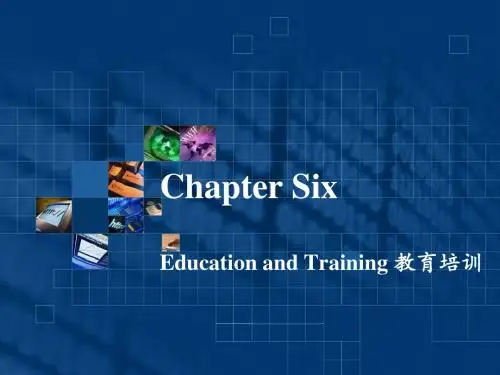
FOUNDATIONAL VALUES IN UNIVERSITY EDUCATION 1Chapter 1IntroductionDefinition of Education: An OverviewThis introductory chapter presents a general introduction to the book. The existence of a moral vacuum in the education of the youth is explicitly presented as an issue in need of serious attention.Education is one of the basic activities of people in all human societies. The continued existence of society depends upon the transmission of culture to the young. It is essential that every new generation must be giventraining in the ways of the group, so that the same tradition will continue. Every society has its own ways andmeans of fulfilling this need. Education has come to be one of the ways fulfilling this need.The term “education” is derived from the Latin work “educare”, which literally means to “bring up” and is connected with the word “educere”, which means to “bring forth”. The idea of education is not merely toimpart knowledge to the pupil in some subjects, but to develop in him those habits and attitudes with which hemay successfully “face” the future.The Latin author Varro wrote—“The midwife brings forth, the nurse brings up, the tutor trains, and the master teaches”. Plato was of the opinion that the end of education was to develop in the body and in the soul(of the pupil) all the beauty and all the perfection of which they are capable. It means, in short, a sound mind insound body (“mens sana incorporate sano”).According to the Aristotelian conception, the aim of education is “to develop man’s faculties, especially, his mind, so that he may be able to enjoy the contemplation of the supreme truth, goodness, and beauty, inwhich perfect happiness essentially consists”.As Peter Worsety says, “A large part of our social and technical skills are acquired through deliberate instruction which we call education. It is the main working activity of children from the ages of five to 15 andoften beyond”. A large part of the budget of many developed and developing countries is set apart for education.Education employs a large army of people.Sociologists are becoming more and more aware of the importance and role of educational institutions in the modern industrialized societies. In recent years, education has become the major interest of somesociologists. As a result, a new branch of sociology called “sociology of education” has become established.Durkheim (1961)conceived of education as “the socialization of the younger generation”. He further states that it is “a continuous effort to impose on the child ways of seeing, feeling, and acting, which he couldnot have arrived at spontaneously”.Education as a Social ProcessEducation stands for deliberate instruction or training. Man does not behave in society impulsively or instinctively. He behaves in a way according to which he is trained. Some thinkers have equated it withsocialization. A few other regard education as an attempt to transmit the cultural norms of the group to itsyounger members. It is also understood more knowledge. All these three interpretations of education as aprocess or a continuous entity the word process stressed continuity.Firstly, education, viewed as socialization, is continuous. Socialization is social learning. This social learning is not intermittent but continuous. Perfection in social learning is rarely achieved the more we try tolearn our own society and fellow beings the more remains to be learned.All Rights Reserved.。
初三英语第十一单元作文The Importance of Learning English in Junior High SchoolIntroductionEnglish is undoubtedly one of the most widely spoken and influential languages in the world. As globalization continues to connect people from different cultures and backgrounds, the ability to communicate effectively in English has become increasingly crucial. In the context of junior high school education, the importance of learning English cannot be overstated. This essay aims to explore the significance of learning English in junior high school, examining itshistorical background, various perspectives, and providing a critical evaluation of its benefits and drawbacks. Additionally, the essay will offer recommendations for the future implications of English education in junior high school.Historical Background and DevelopmentThe inclusion of English as a subject in junior high school curriculum can be traced back to the late 19th century when the British Empire's influence spread across the globe. English became a language of trade, diplomacy, and international communication, leading to its widespread adoption as a second language in many countries. In the context of junior high school education, the emphasis on English education has grown significantly over the years, reflecting the increasing importance of English proficiency in a globalized world.Perspectives and OpinionsThe significance of learning English in junior high school is a topic that elicits a wide range of perspectives and opinions. Proponents of English education argue that it provides students with valuable skills that are essential for their future academic and professional endeavors. They believe that proficiency in English opens up a world of opportunities, allowing students to access a wealth ofknowledge, connect with people from diverse backgrounds, and pursue higher education and career prospects on a global scale.On the other hand, critics of English education in junior high school raise concerns about the potential marginalization of local languages and cultures. They argue that an excessive focus on English may lead to the neglect of indigenous languages, eroding cultural identity and linguistic diversity. Additionally, some critics question the practicality of English education for all students, particularly those from disadvantaged socio-economic backgrounds, suggesting that resources could be better allocated to other subjects or initiatives.Case Studies and ExamplesTo illustrate the impact of English education in junior high school, it is valuable to consider case studies and examples from different regions. In countries such as South Korea and Japan, where English proficiency is highly prioritized, students undergo rigorous English education from an early age. As a result, these countries have produced a significant number of proficient English speakers who have excelled in international academic and professional settings.Conversely, in regions where English education is less emphasized, such as some parts of rural China or India, students may face challenges in accessing the same opportunities as their English-proficient counterparts. This disparity highlights the unequal distribution of resources and the potential consequences of limited English proficiency in a globalized society.Critical EvaluationThe benefits of learning English in junior high school are undeniable. Proficiency in English equips students with the ability to communicate effectively on a global platform, access a wide range of information and resources, and pursue academic and career opportunities beyond their local context. Furthermore, English education fosters cognitive development, critical thinking, and cross-cultural understanding, which are essential skills for success in the 21st century.However, it is important to acknowledge the drawbacks of an excessive focus on English education. The potential marginalization of local languages and cultures, as well as the unequal distribution of resources, are valid concerns that must be addressed. Moreover, the pressure to excel in English proficiency may lead to stress and anxiety among students, impacting their overall well-being and mental health.Future Implications and RecommendationsLooking ahead, the future implications of English education in junior high school necessitate a balanced approach that acknowledges the importance of English proficiency while preserving linguistic and cultural diversity. It is crucial to promote multilingualism and provide support for indigenous languages, ensuringthat students have the opportunity to develop proficiency in both English andtheir native language.Furthermore, recommendations for the future of English education in junior high school include the implementation of inclusive and diverse learning materials that reflect the experiences and perspectives of various cultures and communities. This approach can foster a more inclusive and equitable English education system that celebrates linguistic diversity and promotes global citizenship.In conclusion, the importance of learning English in junior high school is a multifaceted issue that requires careful consideration of its historical background, diverse perspectives, and future implications. While English proficiency offers numerous benefits for students in a globalized world, it is essential to address the potential drawbacks and ensure a balanced approach that values linguistic diversity and cultural heritage. By embracing the recommendations for the future of English education, junior high schools can empower students to navigate the complexities of a globalized society while preserving the richness of their own language and culture.。
中国式教育改革英语作文China's education reform is a hot topic these days. Many people believe that the traditional Chinese education system is too focused on rote memorization and lacks creativity. They argue that students should be encouraged to think critically and express their own ideas.In recent years, there have been calls for a more student-centered approach to education in China. This means that teachers should act as facilitators rather than lecturers, and students should be given more freedom to explore their interests and learn at their own pace.Another important aspect of education reform in China is the emphasis on practical skills. Many people believe that the current education system is too focused on academic achievement and neglects the development of practical skills that are essential for success in the real world. Therefore, there is a push to incorporate more vocational training and hands-on learning into thecurriculum.Furthermore, there is a growing recognition of the importance of holistic education in China. This means thatin addition to academic subjects, students should also be taught values, ethics, and social skills. The goal is to cultivate well-rounded individuals who not only excel academically but also contribute positively to society.In order to implement these reforms, China is investing heavily in teacher training. Teachers are being encouragedto adopt new teaching methods and techniques that promote student engagement and critical thinking. Additionally, schools are being equipped with modern educationalresources and technology to enhance the learning experience.Despite these efforts, there are still challenges that need to be addressed in China's education reform. One ofthe main challenges is the pressure to perform well on standardized tests. Many students and parents stillprioritize academic achievement over other aspects of education, which can hinder the implementation of student-centered and holistic approaches.In conclusion, China's education reform is a complexand ongoing process. While there have been significant efforts to shift towards a more student-centered, practical, and holistic approach, there are still challenges to overcome. However, with continued investment in teacher training and the support of parents and society, China has the potential to create a more inclusive and effective education system.。
Teachers College Record Volume 113, Number 6, June 2011, pp. 1135–1153Copyright © by Teachers College, Columbia University0161-4681
Introduction: Rethinking Globalization,Education, and Citizenship
DAVID T. HANSENTeachers College, Columbia University
Background/ Context:This essay is a part of a special issue that emerges from a year-longfaculty seminar at Teachers College, Columbia University. The seminar’s purpose has beento examine in fresh terms the nexus of globalization, education, and citizenship.Participants come from diverse fields of research and practice, among them art education,comparative education, curriculum and teaching, language studies, philosophy of educa-tion, social studies, and technology. They bring to the table different scholarly frameworksdrawn from the social sciences and humanities. They accepted invitations to participatebecause of their respective research interests, all of which touch on education in a globalizedworld. They were also intrigued by an all-too-rare opportunity to study in seminar condi-tions with colleagues from different fields, with whom they might otherwise never interactgiven the harried conditions of university life today. Participants found the seminar gener-ative in terms of ideas about globalization, education, and citizenship. Participants alsoappreciated what, for them, became a novel and rich occasion for professional and personalgrowth.Purpose/ Objective:The purpose of the present essay is to outline the aims and activities ofthe faculty seminar on globalization, education, and citizenship. I describe its origins, itscomposition, and the sequence of discussions, readings, and writings participants under-took. I discuss how the seminar adopted as its method of working the form of the spoken andwritten essay. “Essay” derives from the French essayer, denoting a trial of ideas in an attemptto understand. The introduction also anticipates the scope and style of the essays that com-prise this special issue of the journal.Conclusions/ Recommendations:The final portion of this introduction raises questions forcontinued research and practical wisdom. Among them are questions about the nature andpurposes of education in our time (with education treated as more than schooling); themeaning of unofficial as well as official notions of citizenship; the dynamics and problem-atic of “belonging” in a changing world; the meaning of learning as well as misuses of the1136Teachers College Recordconcept; the place of beauty in inquiry into globalization, education, and citizenship; howthe essay form opens up a reconsideration of faculty support and assessment; the benefitsand limitations of technology; and the meaning of respect as an orientation in research andpractice in globalized conditions.
Globalization . . . . education . . . . citizenship. Are there three weightierterms in the lexicon of schools and universities today? The contributorsto this special issue of Teachers College Recordaspire to transform the bur-den of the terms by handling them lightly—though not lightheartedly.The hopes and fears that the terms evoke are much too important forfrivolity. I mean “lightly” in Italo Calvino’s sense of the writer resisting thegravitational force of habit, expectation, and stereotype. This sprightly,beloved Italian writer of unusual novels, literary criticism, and muchmore sought a method that, as he put it, “involved the subtraction ofweight. I have tried to remove weight, sometimes from people, sometimesfrom heavenly bodies, sometimes from cities; above all I have tried toremove weight from the structure of stories and from language” (1993, p.3). Calvino refers to “the Ineluctable Weight of Living” (he dramaticallycapitalizes the terms), and tips his hat to writers such as Milan Kunderawho have rendered this hard reality in prose. Calvino pictures his task asilluminating why it is that, in the absence of lightness, the choices and val-ues that people embrace can turn around and constrict them. His gentlehandling of ungentle things in his Six Memos for the Next Millenniumremains an offering to all in this millennium who care about the scopeand quality of human communication.The contributors to the issue presented here met as a faculty seminarduring the academic year 2009–2010. Although we did not read Calvino’sbook together, we did find ourselves reading the world in the spirit heevokes. In the sections that follow, I will describe the seminar in order toprovide a context for the essays to come. I will conclude by sketchingthemes for future research and practice that appear across the essays. Asreaders will discover, the contributors do not presume to offer brand-new, unprecedented insights into how to address today’s globalized con-ditions. Instead, the contributors show why fusing a sense of wonder witha sense of concern can, at least at times, dissolve weight and allow humanbeings to move, breath, create, and dwell.